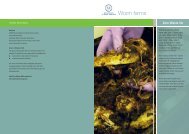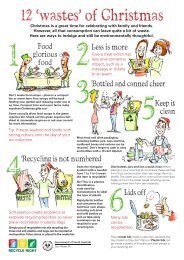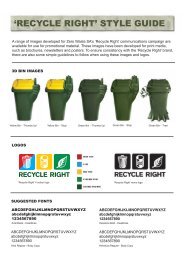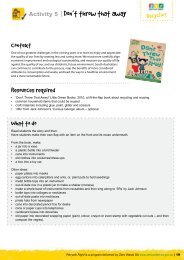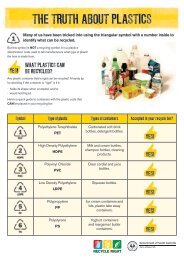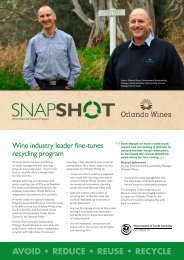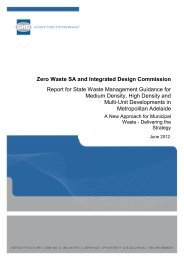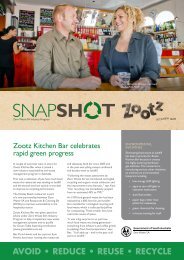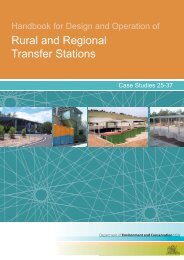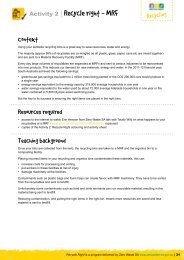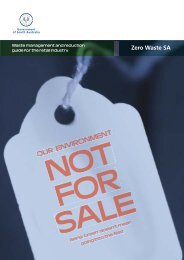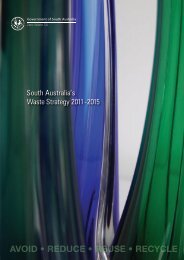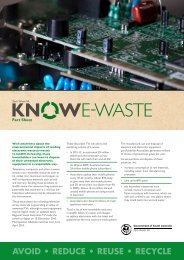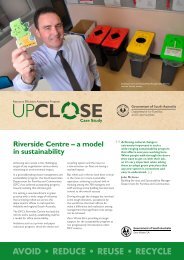Annual Report 2010-11 - Zero Waste SA - SA.Gov.au
Annual Report 2010-11 - Zero Waste SA - SA.Gov.au
Annual Report 2010-11 - Zero Waste SA - SA.Gov.au
You also want an ePaper? Increase the reach of your titles
YUMPU automatically turns print PDFs into web optimized ePapers that Google loves.
34<br />
Targets for waste reduction and recycling<br />
will be identified and reported on through<br />
the waste service.<br />
Adelaide Shores ($14,425)<br />
Adelaide Shores is seeking to improve its waste, energy,<br />
carbon, water and biodiversity. Adelaide Shores manages<br />
a 135 hectare tourism and recreation reserve on Adelaide’s<br />
West Beach which comprises a caravan park, café, resort<br />
area with self-contained accommodation, public golf<br />
course and golf club function area. A key improvement<br />
is the introduction of an organic composting trial to<br />
capture and use food waste generated from its café and<br />
staff lunch areas. Adelaide Shores is also supporting Ms<br />
Kerrie Bell, the second student of the <strong>Zero</strong> <strong>Waste</strong> <strong>SA</strong> Pam<br />
Keating Memorial Scholarship program whose research<br />
will help to maximise the amount of food waste that can<br />
be collected through the Adelaide Shores caravan park.<br />
Department of Health ($25,000)<br />
The Department of Health (DoH) is responsible for<br />
providing a range of health services to the South<br />
Australian community. The department’s diverse sites<br />
across the State include hospitals, health and medical<br />
research centres, and pathology, epidemiology, and<br />
drug and alcohol services, and offices. To improve waste<br />
management practices across all departmental operations,<br />
<strong>Zero</strong> <strong>Waste</strong> <strong>SA</strong> has provided funding for a waste<br />
management plan. The plan will assist DoH to establish<br />
a consistent level of service and best practice resource<br />
management throughout all sites. Targets for waste<br />
reduction and recycling will be identified and reported on<br />
through the waste service. The lessons learnt may be able<br />
to be applied to other State <strong>Gov</strong>ernment agencies that are<br />
also responsible for managing multiple and diverse sites.<br />
Jurlique International ($19,323)<br />
Jurlique International is a South Australian based<br />
manufacturer of organic skin care products. In its<br />
commitment to becoming environmentally sustainable,<br />
Jurlique is piloting a sustainability management system<br />
(SMS) with the assistance of <strong>Zero</strong> <strong>Waste</strong> <strong>SA</strong> to improve<br />
resource efficiency across its operations. To support this<br />
aim, <strong>Zero</strong> <strong>Waste</strong> <strong>SA</strong> has funded Jurlique to undertake<br />
Environmental Auditor training for key staff to build their<br />
skills for implementing the SMS.<br />
Orlando Wines ($10,000)<br />
Orlando Wines is part of the international wine and<br />
spirit company Pernod Ricard, which has adopted a range<br />
of policies aimed at protecting the environment. The<br />
South Australian branch of Orlando Wines joined REAP<br />
to independently verify waste management practices<br />
across its three South Australian sites: Rowland Flat<br />
winery, Jacob’s Creek Visitor Centre and Richmond Grove<br />
winery. <strong>Zero</strong> <strong>Waste</strong> <strong>SA</strong> supported an independent waste<br />
and recycling review of the three sites. The results show<br />
Rowland Flat winery is performing exceptionally well in<br />
waste management by recycling 91% of all solid waste<br />
produced (the other two sites achieve resource recovery<br />
rates of 73% and 47% respectively). The report also<br />
highlighted areas of focus for achieving even better<br />
waste management practices. Orlando Wines intends to<br />
continue the relationship with <strong>Zero</strong> <strong>Waste</strong> <strong>SA</strong> and work<br />
on improving waste management systems and practices<br />
across its three sites.<br />
South Australian Cricket Association ($9,950)<br />
Adelaide Oval is one of the world’s most famous test<br />
cricket grounds. It can accommodate up to 34,000<br />
spectators for cricket, and as many as 120,000 may attend<br />
during a five-day test match. In March 2012, a $535<br />
million redevelopment will transform Adelaide Oval into<br />
a 50,000 seat venue. <strong>Zero</strong> <strong>Waste</strong> <strong>SA</strong> has worked with the<br />
South Australian Cricket Association (<strong>SA</strong>CA) to improve<br />
its environmental operations, including funding a waste<br />
and recycling improvement review and developing a<br />
case study to highlight its achievements. With increased<br />
capacity and a planned redevelopment, recycling is now<br />
a priority at the historic stadium as <strong>SA</strong>CA pursues best<br />
environmental practice across its operations.



